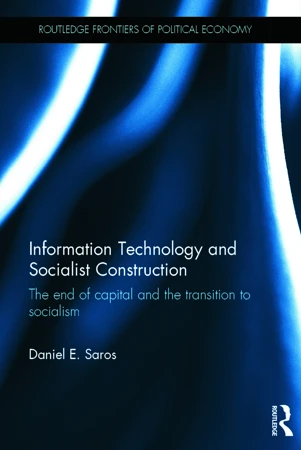Information Technology and Socialist Construction – The End of Capital and the Transition to Socialism

Blurb
The failure of command central planning in the twentieth century has led to a general disillusionment within the socialist movement worldwide. Some alternatives to capitalism have been proposed since the end of the Cold War, but none has offered an alternative form of economic calculation. This book explains how modern information technology may be used to implement a new method of economic calculation that could bring an end to capitalism and make socialism possible. In this book, the author critically examines a number of socialist proposals that have been put forward since the end of the Cold War. It is shown that although these proposals have many merits, their inability effectively to incorporate the benefits of information technology into their models has limited their ability to solve the problem of socialist construction. The final section of the book proposes an entirely new model of socialist development, based on a "needs profile" that makes it possible to convert the needs of large numbers of people into data that can be used as a guide for resource allocation. This analysis makes it possible to rethink and carefully specify the conditions necessary for the abolition of capital and consequently the requirements for socialist revolution and, ultimately, communist society. Information Technology and Socialist Construction will be of interest to students and scholars of political economy, the history of economic thought, labour economics and industrial economics. Source: PublisherBook summary
Daniel Saros writes about how modern information technology can be used to implement a new method of economic calculation for a better socialist alternative to capitalism. He provides an analysis of relevant literature on the possibility of socialism along with description of non-market-based system of economic calculation and allocation. He re-emphasises on what defines a working class and claims that technology have evolved to the point that it can be used to propose realistic model of a future socialist order.
Comment from our editors:
The book is an unusual and remarkable contribution to the debate on socialist transformation and economic planning. Particularly noteworthy is the independent model for democratic economic planning that the author develops from scratch in Chapter 7. The other parts of the book, which examine, among other things, the Socialist Calculation debate and the market-liberal critique of planned economic alternatives to capitalism, are quite interesting, but in some cases the writing style is not very structured. Although the author says that he broke away from the tradition of radical economics in 2020 and now publishes as a liberal economist, his model for democratic planning is a central point of reference for the increasingly dynamic debate on alternatives to the capitalist market economy based on digital coordination tools. A very good insight into Daniel E. Saros' model is offered in the Future Histories Podcast.

